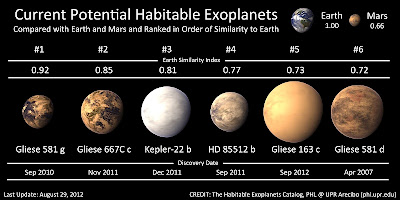To better understand the significance of the discovery, we contacted Abel Méndez, an Associate Professor of Physics and Astrobiology in the Planetary Habitability Laboratory at the University of Puerto Rico at Arecibo. Méndez told us that the detection of Earth-like worlds is pacing up — and that there's likely a lot more to come. "There are more observatories dedicated to these types of searches, "he told io9, "and many of them now have the required sensitivity to find these potentially habitable planets."
Considered a superterran, or "super-Earth", the exoplanet is being called Gliese 163c. Located at the reasonable distance of 50 light years from Earth in the Dorado constellation, it is no smaller than 6.9 Earth masses and requires only 26 days to orbit its star. . . .
Continue Reading . . .
See Also:
Kepler Space Telescope Spots 41 New Exoplanets
Do Extra-Solar Planets Really Exist?
The 5 Coolest Planets Orbiting Distant Stars
SHARE YOUR UFO EXPERIENCE
↑Grab this Headline Animator
~~BOOK SALE~~


-This is news of the worst kind, (other than humans having access to ufo super-technology)
ReplyDelete-If allowed to mass exodus into deep space, there is a 100% probability that humankind will despoil and decimate every planet and form of life they come across that is unable to defend itself
-The Psychopathic species of human will have an unlimited venue in which to create untold diabolical havoc
-The only bright spot in this news is, Because humans are parasitic by their nature, they may serve to keep non-human, non-terrestrial parasitic races in check, who will in turn, keep the humans themselves in check. A stalemate which would benefit a universe full of potential victims